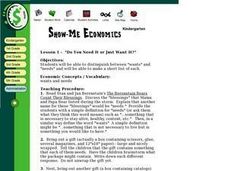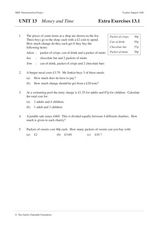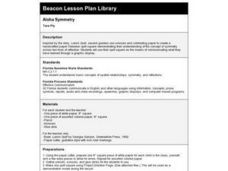Curated OER
Polluting the Environment
Fourth graders construct mini-ecosystem, pollute the ecosystem, observe, collect, and record data on the effects of these pollutants on their ecosystem, organize data on spreadsheets, create graphs, and design presentations to share with...
Curated OER
Opinions, Please!
Students discuss the meaning and purposes of polls and surveys. After reading an article, they analyze the results of a poll given to residents of New York City. They create a survey of their own and analyze the data to write a written...
Curated OER
Making It Balance
Students listen to story, "The 100-Pound Problem," compare their weight with character in story, and weigh different classroom items using nonstandard units and standard units. They experiment with different items that can make scale...
Curated OER
Burger King Investigation
Young scholars study data on the nutritional value of Burger King meals in order to discover its nutritional value and also to compare the meals, using mathematical computation, to the recommended daily diet. In this data handling...
Curated OER
Presentation of Quantitative Data- Vertical Line Diagrams
In this quantitative data worksheet, students examine how vertical line diagrams can be used to display discrete quantitative data. They read about the use of tally charts to create vertical line graphs that display the data. They...
Curated OER
Introducing Powers and Models II: Multiplication Rummy
Students practice their multiplication table using a game to increase speed and accuracy. In this multiplication activity, students distribute 5 random number cards to each player (2-5 players) and they "play" if their hand includes 3...
Alabama Learning Exchange
No More Money Trouble
Young consumers explore money identification and counting. In this cross-curricular money instructional activity, they participate in comprehension and writing activities prior to and after reading the book Money Trouble by Bill Cosby....
Curated OER
Migration of the Neo-Tropical Songbirds
Fifth graders plot the migration of birds using Google Earth. In this activity on bird migration, 5th graders work in groups to plot the migration of a group of birds using Google Earth. Students present and discuss their findings and...
Curated OER
Air Pressure & Barometers
Fourth graders observe, measure, and record data on the basic elements of weather over a period of time (i.e., precipitation, air temperature, wind speed and direction, and air pressure). Then, they make a barometer and keep record of...
Curated OER
"Do You Need It or Just Want It?"
Students distinguish between "wants" and "needs." Students make a short list of each. They review The Berenstain Bears Count Their Blessings book and discuss what blessings are. Students then rewrite their list of wants and needs.
Curated OER
Solving Problems Using Quadratic Equations
In this quadratic equation worksheet, learners read short statements and write a quadratic equation to represent the statement. Afterwards, they solve the quadratic equation using factorization. Twelve problems are provided on this...
Curated OER
Trumpet of the Swan
In this literature worksheet, students, after reading the book Trumpet of the Swan, survey their friends to find out who was their favorite character from the novel. Students keep a tally sheet with their findings on it.
NASA
Benford's Law
In this Benford's Law learning exercise, high schoolers read about the first digit frequency of numbers. Students solve 3 problems about sunspot numbers, solar wind magnetism and the depth of the latest earthquakes by using on line sites...
Curated OER
Money and Time
In this money and time activity, students read money problems and determine the total cost and the amount of change to be given to a customer. They add moments of time and determine the correct amount of hourly pay earned. This nine-page...
Curated OER
Zoom Out
Students explore visual perception and how objects change as distance changes. In this distance and vision lesson, students practice their scientific inquiry skills. Students practice drawing objects from different points of view in...
Curated OER
Financial Wizard
Students determine the best way to earn money. In this financial wizard lesson, students read a story. They compare different jobs, the rate of pay for each job and the number of hours required to do the job. Students analyze which...
Curated OER
History in the Making: The Tortilla
Fourth graders examine the history of the tortilla and extend the study across the curriculum. In this history of the tortilla lesson, 4th graders research the background of the tortilla, determine the ingredients, and work with the...
Curated OER
Running of the Bulls
Students examine what might be in store for Wall Street following the NASDAQ's 547.57 point plunge on Tuesday, April 4, 2000. They evaluate how they might manage a heavily laden high-tech portfolio before deciding how to invest in the...
Curated OER
Taste
Young scholars collect data to be used in selecting the class favorite taste. They predict which among the common flavors such as salty, sweet, sour, or bitter is preferred.
Curated OER
Quarters, Dimes, and Nickels
Second graders add and subtract coins, decide which coins to use to purchase an item, and compare values of sets of coins.
Curated OER
Measuring Up on the Mayflower
Second graders use a meter tape to compare the length of the Mayflower to a basketball court and make homemade butter for crackers. Afterward, all students sit inside the makeshift Mayflower's dimensions and enjoy their Pilgrim butter.
Curated OER
Aloha Symmetry
Students create handcrafted paper Hawaiian quilt squares. They do this to show the concept of symmetry across two lines of reflection.
Curated OER
Proportionality Using Wind in the Willows
Students examine proportionality in Wind in the Willows by comparing Mr. Toad, objects proportional to him and objects proportional to humans. They then measure a stuffed Mr. Toad and make common objects proportional to Mr. Toad???s...
Curated OER
Chances Are-Part 1
Students are introduced to the idea of probability by discussing the likelihood of events occurring. Pupils describe events that are certain, impossible, likely, and unlikely to occur. They determine the likelihood of an event occurring...

























